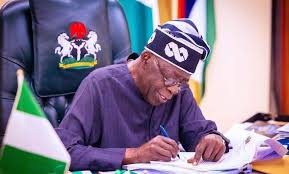BUSINESS
Tinubu Demands Senate Approval of CBN’s Monetary Policy Committee

By Eze Okechukwu, Abuja
President Bola Tinubu has sought the Senate confirmation for the appointment of a chairman and members for the Central Bank of Nigeria, CBN’s Monetary Policy Committee (MPC).
Tinubu’s request was contained in a letter titled: “Constitution of Monetary Policy Committee for the Central Bank of Nigeria (CBN)”, addressed to President of the Senate, Godswill Akpiabio and read during plenary yesterday.
He stated that the request was “In accordance with the provisions of section 12 of CBN Act 2007.
“I am pleased to present for confirmation by the Senate the confirmation of the under-listed 12 persons as chairman and members of the Monetary Policy Committee of the Central Bank of Nigeria.
”The President listed the chairman of the 12-member committee as Olayemi Cardoso, CBN Governor while the members are Muhammad Abdullahi, CBN Deputy Governor, Bala Bello CBN Deputy Governor, Emem Usoro, CBN Deputy Governor and Philip Ikeazor CBN Deputy Governor.
The rest are Lamido Yuguda, Director General, Security and Exchange Commission, SEC; Jafia Lydia Shehu, Permanent Secretary, Federal Ministry of Finance; Muritala Sabo, CBN Director; Aloysius Uche, Agu Paulin, Mustapha Akinwumi and Bamidele Amon.
Tinubu urged the Senate to give the request expeditious consideration.
The Senate President, thereafter, referred the letter to the Committees on Finance, and Banking, Insurance and other Financial Institutions for further legislative inputs and reported back to the senate in one week.
BUSINESS
Afreximbank Seeks Digital Innovation to Unlock Nigeria’s Trade Potential

The African Export-Import Bank (Afreximbank) said digital transformation is critical to unlocking trade and investment potential under the African Continental Free Trade Area (AfCFTA).
Dr Yemi Kale, Group Chief Economist and Managing Director, Research, Afreximbank, stated this at an engagement event on “Unlocking Nigeria’s Trade and Investment Potential Through Digital Innovation and the Abuja Africa Trade Centre (AATC)” on Thursday in Abuja.
Kale said the AfCFTA had created the world’s largest new trading bloc, representing a unified market of over 1.
3 billion people and a combined GDP of more than 3.4 trillion dollars.“This integration goes beyond a symbolic milestone.
“It is a strategic platform capable of redefining how African economies produce, trade and compete in a rapidly changing global economy,” he said.
He noted that regional integration presented a once-in-a-generation opportunity to expand value chains, reduce dependence on primary commodities, accelerate industrialisation and strengthen Africa’s position in global markets.
Kale, however, expressed concern that intra-African trade still averages between 15 and 18 per cent, compared with 60 per cent in Europe and 40 per cent in Asia.
He identified market fragmentation, high logistics costs, gaps in trade data and cross-border payment challenges as factors limiting trade growth across the continent.
“If Africa must rise to its true economic stature, we must confront these obstacles with clarity, urgency and innovation.
“We must do so using one of the most powerful accelerators available to us and that is digital transformation.”
He explained that digital technologies such as end-to-end supply chain systems, automated customs services, e-commerce platforms, AI-driven market intelligence and digital payments were changing the structure of global trade.
Kale cited Rwanda’s digital single-window model and the growth of mobile money platforms as evidence of successful innovation
He noted that Afreximbank’s Pan-African Payment and Settlement System (PAPSS) was projected to save the continent billions in currency conversion costs.
According to him, digital innovation supports small and medium-sized businesses, including young entrepreneurs who can now access wider markets using online platforms.
He said that Nigeria’s large youth population gave the country a strategic advantage to lead Africa’s next phase of digitally-enabled trade.
“With 65 per cent of Nigeria’s population under 25, our young innovators are creating solutions, founding start-ups and shaping new industries.
“Strengthening skills, regulation, finance and collaboration will accelerate this impact,” he said.
He said Afreximbank was supporting this growth through the African Trade Gateway (ATG), trade intelligence services, and the AfCFTA Adjustment Fund among other initiatives.
“The ATG integrates trade information, due diligence, secure payments, and market insights, which are precisely the tools required for African businesses to compete effectively in an integrated continental market.
“It is, therefore, encouraging that Nigeria has taken a leadership role in advancing these priorities.”
Kale added that the Abuja Afreximbank Africa Trade Centre (AATC) represented the bank’s commitment to modernise trade by providing facilities that integrate information services, exhibition spaces, a business hotel and access to digital trade tools.
According to him, the centre is the first in a network of one-stop trade hubs being developed across Africa and the diaspora.
Kale said the AATC would help businesses access financing, partners, market intelligence, logistics support and technology services within a single space, reducing barriers and transaction costs.
“This building is more than a physical structure. It represents a catalytic platform for integration, innovation and investment,” he said.
He urged stakeholders to work together to drive digital transformation and build a continent where entrepreneurs can compete globally.
“This is not a distant dream. It is a future within our reach if we embrace innovation and collaboration,” he said.
Participants at the event were shown a live demonstration of Afreximbank’s Trade Intelligence Solutions- ATG and TRADAR and explored the role of AATCs in promoting trade and investment.
The event brought together financial institutions, trade organisations, investors and business owners.
Agriculture
FG Empowers 9,870 Farmers with Inputs, Modern Rice Technologies in Kano

The Federal Government, through the Kano State Special Agro-Processing Zone (SAPZ) Programme in partnership with IFAD, has empowered 9,870 rice farmers in Kano with climate-resilient inputs and modern rice production technologies.
This was contained in a statement issued by the SAPZ Knowledge Management and Communication Officer, Rabi Mustapha.
The State Project Coordinator, Aminu Iliyasu, disclosed this on Sunday during the Farmers Field Day at Chiromawa Garin Babba Cluster in Garun Malam Local Government Area.
He said the exercise was organised to expose the farmers to Science-based and practical solutions capable of enhancing yields, improving food security, and boosting rural livelihoods.
Iliyasu described the field day as a celebration of knowledge, innovation and the resilience of smallholder farmers.
He explained that the SAPZ initiative in Kano aimed to expand access to improved technologies, strengthen extension services, reduce post-harvest losses and create market opportunities for rural farmers.
“These innovations are not theoretical. They are practical solutions that farmers can adopt immediately to raise productivity and increase income,” he said, while commending the support of local authorities.
Mustapha said the inputs distributed to 9,870 farmers included FARO 44 improved seeds, Urea and NPK fertilizers, and insecticides, targeting beneficiaries in Garun Malam, Gezawa, Bichi and Bagwai LGAs during the 2025 wet season.
She added that experts trained farmers on soil selection, seed dressing, nursery establishment, land preparation, and timely transplanting at proper spacing.
“They also covered fertilizer management, weed control, Integrated Pest Management and water regulation to boost rice yields.
“The training emphasised harvesting at optimal maturity, drying paddy to safe moisture levels, and fumigation using phostoxin to prevent storage losses,” she stated.
A beneficiary, Salamatu Ali, said the intervention had positioned Kano farmers to boost yields, withstand climate pressures and increase household incomes.
Another farmer, Huwaila Ibrahim, said the programme transformed her approach to rice production.
“Before, we planted without checking whether the land was suitable.
“Now, we first assess the soil to ensure it matches the seed variety. This season, we cultivated FARO 44,” she said.
Ibrahim added that her output increased from 20–25 bags per acre to about 40 bags after adopting the improved technologies.
Agriculture
FG Unveils National Agricultural Sample Survey, 2023 Report for Food Security

The Federal Government has launched the National Agricultural Sample Survey (NASS) 2023 report, towards developing data-driven policies to achieve food security and economic diversification.
Minister of Agriculture and Food Security, Sen. Abubakar Kyari, made this known at the launch of “Disseminating the National Agricultural Sample Survey (NASS) 2023 report” on Tuesday in Abuja.
“As a Ministry, we will apply these findings across the core levers of agricultural transformation, ensuring that our programmes remain data-driven, impact-focused and aligned with the aspirations of the Renewed Hope Agenda.
“A nation that measures well governs well. And food security begins with information security.
“This report should be seen as a practical tool for decision-making, one that guides policy choices, informs investment priorities and accelerates the reforms required across Nigeria’s agricultural sector.
“In a country of more than 232 million people, the strength of our food system depends on the quality of the data that guides national decisions,” Kyari said.
The minister explained that without credible evidence, interventions risk being misdirected and investments may fail to reach the areas of highest need.
The News Agency of Nigeria reports that Food and Agriculture of the United Nations (FAO) in collaboration with the Federal Ministry of Agriculture and Food Security, National Bureau of Statistics and the World Bank launched “Disseminating the National Agricultural Sample Survey NASS the 2023 report”.
He stated that the National Agricultural Sample Survey provides reliable, sector-wide data that helps the agriculture sector track production, understand emerging trends, and guide policy decisions.
Kyari added that the launch and dissemination of the National Agricultural Sample Survey 2023 represents an important step in ensuring that our national choices are informed, targeted, and grounded firmly in evidence.
“This report therefore represents more than statistical outputs; it reflects our commitment to transparency, disciplined planning, and the sustainable development of Nigeria’s agricultural sector.
“The findings of the National Agricultural Sample Survey 2023 present a clear and compelling picture of national production.
“The data we are presenting today is central to that mandate because it gives us the precision required to target interventions, close gaps, and drive the reforms needed to secure our nation’s food system.
“These data points also remind us that every figure reflects real activity across the country, from production to processing to marketing.
“With these digital foundations in place, insights from the NASS move from static data to operational intelligence, enabling a more transparent, efficient and connected agricultural system,” the Minister said.
The Director-General FAO representative in Nigeria, Dr. Hussein Gadain, said the NASS 2023 Report is not just a presentation of data but a celebration of collaboration, commitment, and progress towards building a stronger, more resilient agricultural sector in Nigeria.
Similarly, Adeyemi Adeniran Statistician General of National Bureau of Statistics (NBS) said that the NASS Report 2023 provides critical information on crop production, livestock, aquaculture, labour amongst all.
Adeniran who was represented by David Babalola an official of NBS said that data is essential for shaping effective policies and driving sustainable growth.
According to him, the survey also reaffirms the national bioscience commitment to upholding global best practices in data production through improved methodologies, enhanced field operations, rigorous quality data assurance processes and development of modern digital tools, in Nigeria.
Henry Karshima, Assistant Chief Forest Officer in the Ministry of Environment said that the role of agriculture cannot be overemphasised in food security especially with the launch of the survey.
Mr Abdulhameed Umar National Project Coordinator for Agro-Climatic Resilience in Semi-Arid Landscapes expressed satisfaction with the project in the line of restoring land degradation through data collection.
On his part, Asad Alam, the Senior Economist and Project leader 50×2030 Initiative World Bank Nigeria Development Data Group, Economic Division commended the initiative of making data a priority in agricultural activities to ensure food security.

























